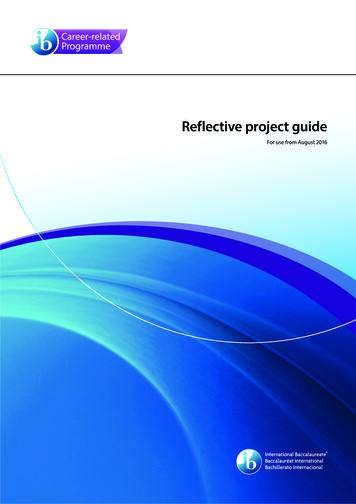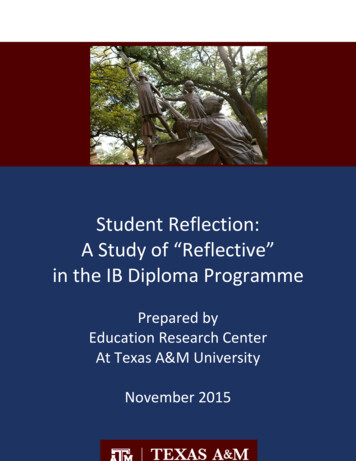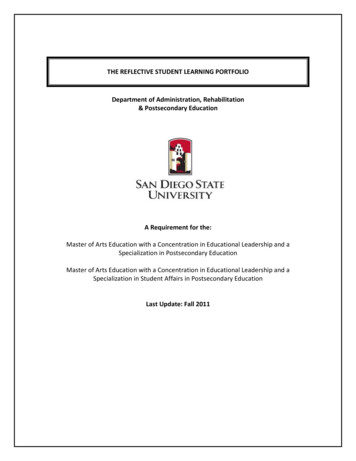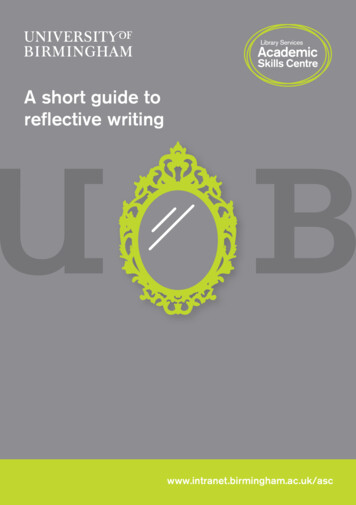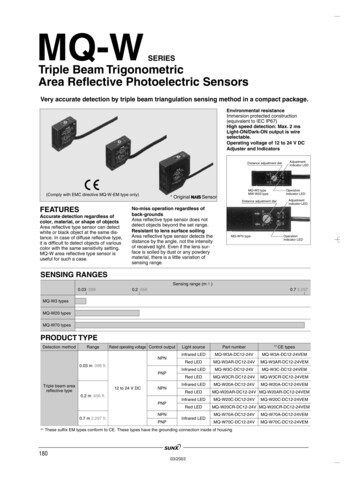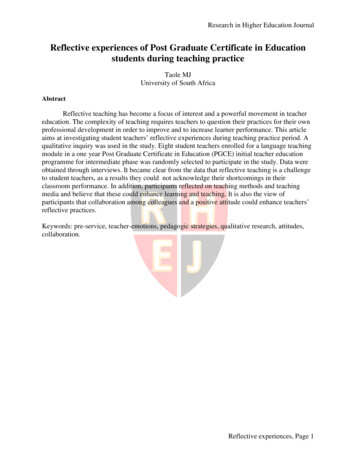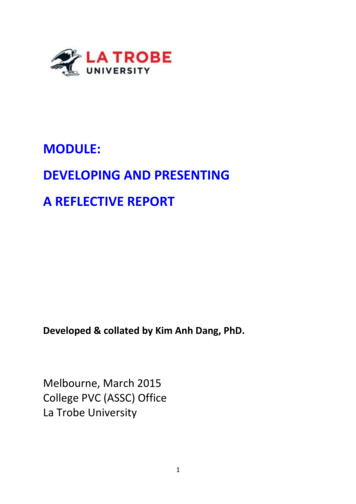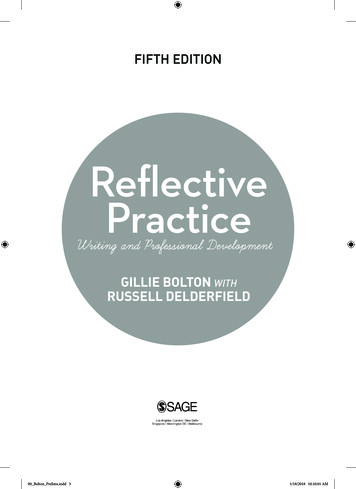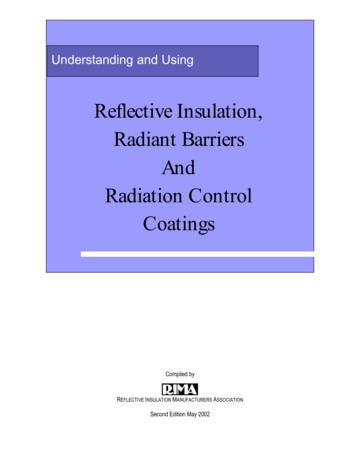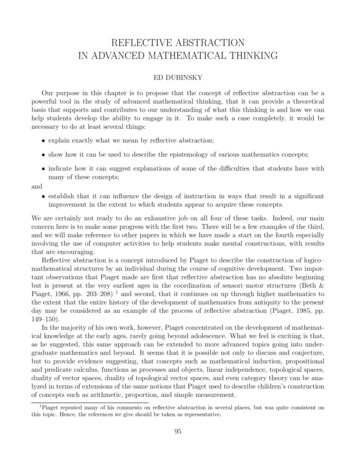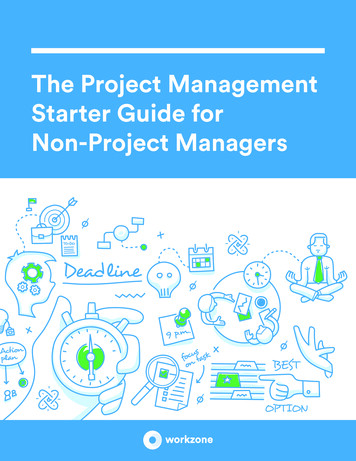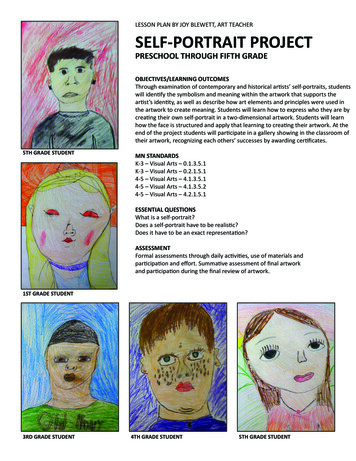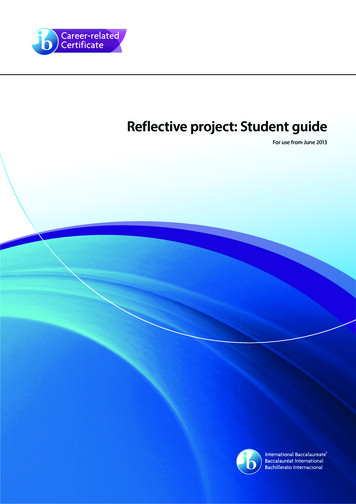
Transcription
Reflective project: Student guideFor use from June 2013
Reflective project: Student guideFor use from June 2013
IB Career-related CertificateReflective project: Student guidePublished June 2013Published on behalf of the International Baccalaureate Organization, a not-for-profiteducational foundation of 15 Route des Morillons, 1218 Le Grand-Saconnex, Geneva,Switzerland by theInternational Baccalaureate Organization (UK) LtdWebsite: www.ibo.org International Baccalaureate Organization 2013The International Baccalaureate Organization (known as the IB) offers four high-qualityand challenging educational programmes for a worldwide community of schools, aimingto create a better, more peaceful world. This publication is one of a range of materialsproduced to support these programmes.The IB may use a variety of sources in its work and checks information to verify accuracyand authenticity, particularly when using community-based knowledge sources such asWikipedia. The IB respects the principles of intellectual property and makes strenuousefforts to identify and obtain permission before publication from rights holders of allcopyright material used. The IB is grateful for permissions received for material usedin this publication and will be pleased to correct any errors or omissions at the earliestopportunity.All rights reserved. No part of this publication may be reproduced, stored in a retrievalsystem, or transmitted, in any form or by any means, without the prior written permissionof the IB, or as expressly permitted by law or by the IB’s own rules and policy. Seehttp://www.ibo.org/copyright.IB merchandise and publications can be purchased through the IB store athttp://store.ibo.org. General ordering queries should be directed to the Sales andMarketing Department.Email: sales@ibo.orgInternational Baccalaureate, Baccalauréat International and Bachillerato Internacionalare registered trademarks of the International Baccalaureate Organization.
IB mission statementThe International Baccalaureate aims to develop inquiring, knowledgeable and caring young people who help tocreate a better and more peaceful world through intercultural understanding and respect.To this end the organization works with schools, governments and international organizations to developchallenging programmes of international education and rigorous assessment.These programmes encourage students across the world to become active, compassionate and lifelong learnerswho understand that other people, with their differences, can also be right.IB learner profileThe aim of all IB programmes is to develop internationally minded people who, recognizing their commonhumanity and shared guardianship of the planet, help to create a better and more peaceful world.IB learners strive to be:InquirersThey develop their natural curiosity. They acquire the skills necessary to conduct inquiryand research and show independence in learning. They actively enjoy learning and thislove of learning will be sustained throughout their lives.KnowledgeableThey explore concepts, ideas and issues that have local and global significance. In sodoing, they acquire in-depth knowledge and develop understanding across a broad andbalanced range of disciplines.ThinkersThey exercise initiative in applying thinking skills critically and creatively to recognize andapproach complex problems, and make reasoned, ethical decisions.CommunicatorsThey understand and express ideas and information confidently and creatively in morethan one language and in a variety of modes of communication. They work effectivelyand willingly in collaboration with others.PrincipledThey act with integrity and honesty, with a strong sense of fairness, justice and respectfor the dignity of the individual, groups and communities. They take responsibility fortheir own actions and the consequences that accompany them.Open-mindedThey understand and appreciate their own cultures and personal histories, and are opento the perspectives, values and traditions of other individuals and communities. They areaccustomed to seeking and evaluating a range of points of view, and are willing to growfrom the experience.CaringThey show empathy, compassion and respect towards the needs and feelings of others.They have a personal commitment to service, and act to make a positive difference to thelives of others and to the environment.Risk-takersThey approach unfamiliar situations and uncertainty with courage and forethought, andhave the independence of spirit to explore new roles, ideas and strategies. They are braveand articulate in defending their beliefs.BalancedThey understand the importance of intellectual, physical and emotional balance toachieve personal well-being for themselves and others.ReflectiveThey give thoughtful consideration to their own learning and experience. They are ableto assess and understand their strengths and limitations in order to support their learningand personal development. International Baccalaureate Organization 2007
ContentsIntroduction1Overview2Frequently asked questions3Formats8The research process11Developing a good research question12The assessment criteria explained14Selecting a good topic20Ethical guidelines22Checklist23Self-evaluation24Appendix A: Sample initial plan27Appendix B: Sample timeline28Appendix C: Assessment criteria30Reflective project: Student guide
IntroductionThis guide is intended to help you to understand the International Baccalaureate Career-related Certificate(IBCC) reflective project—what it is and how to approach it.The reflective project is an in-depth body of work produced over an extended period and submittedtowards the end of the IBCC. It is a product of your own initiative and should reflect your experience ofthe IBCC. The reflective project is designed to draw together key elements of your wider scheme of study,specifically the career-related study, community and service and the approaches to learning course.You are required to identify and explore an ethical dilemma associated with an issue that arises from yourcareer-related studies and then develop a well-reasoned argument based on appropriate supportingevidence.The aims of the reflective project are to allow you to: produce an extended piece of work engage in personal inquiry, action and reflection on a specific ethical issue develop research and communication skills develop the skills of critical and creative thinking.The reflective project is intended to promote high-level research and communication skills, intellectualdiscovery and creativity. It provides you with an opportunity to engage in personal research under theguidance of a supervisor.You can choose to present your reflective project in a number of different formats, including an essay,a web page, a PowerPoint (or other) presentation, a dialogue, a play, a film, a storyboard or a series ofphotographs.You should be thinking about and working on your reflective project throughout the IBCC programme.Reflective project: Student guide1
OverviewHere are some important details about the reflective project including what it is and what its requirementsare. It is an in-depth body of work.The reflective project requires both breadth and depth in your approach to an issue and its ethicaldilemma. It requires a minimum of 40 hours in and out of class time.It is up to you and your teacher/supervisor to decide how much time you might allocate in class andout of class on your reflective project. However, the IB recommends that you plan for approximately40 hours on your reflective project. It is produced over an extended period of time (submitted towards the end of the IBCC).You should work on the reflective project over the course of your IBCC. It would be helpful to decideon a timeline with your teacher/supervisor on when you begin and finish the reflective project. It is initiated, planned, researched and created by the student.The reflective project must be all your own work. It draws together all parts of the IBCC.The reflective project uses:––your career-related studies as a focus for the chosen issue––the skills you develop in approaches to learning such as the ability to create a reasoned argument(critical thinking), to understand ethical dilemmas (ethical thinking) and to prepare the structureand format of the project itself (communication)––the skills and knowledge you develop in community and serviceFor instance, the four key domains of community and service (knowledge development, personaldevelopment, social development and civic development) improve:––cognitive and intellectual skills––confidence, self-awareness, self-direction and resilience––the ability to interact and work with others––increased awareness of community connections, community problems, citizenship and socialresponsibility.IB Diploma Programme courses may also contribute towards your reflective project. Resources used forDiploma Programme courses, for example, could be used for the reflective project. However, you cannotuse any of your Diploma Programme coursework in your reflective project.Tip: In your approaches to learning course, look for ways to support your reflective project. Askyourself what might be helpful when creating your reflective project. What skills will you need todevelop?2Reflective project: Student guide
Frequently asked questionsWhy is the reflective project a requirement for the IBCC?The reflective project is at the heart of the IBCC—it is what makes IBCC unique. It brings together yourcareer-related studies and the elements of the IBCC core.What does the reflective project require? Investigation on an issue related to your career-related studies and an associated ethical dilemma Personal reflection on your attitudes, values and views Critical thinking Communication skillsWhat are ethics and an ethical dimension?Ethics is based on a set of moral principles of a society or culture that helps to guide behaviours, actions andchoices. The ethical dimension refers to the range of ethical aspects related to an identified topic.What is an ethical dilemma?Within an ethical dimension there are ethical dilemmas. An ethical dilemma is a choice between two (ormore) conflicting moral perspectives where neither choice provides a perfect solution.In the context of the reflective project, you are required to examine an ethical dilemma by examining theadvantages and disadvantages of each moral perspective.What does the word count not include?The maximum word limit for the reflective project is between 750 words and 3,000 words depending onthe format of the reflective project. Remember that the examiners will not read beyond the appropriateword limit when assessing the reflective project.The word count does not include: acknowledgments the contents page maps, charts, diagrams, annotated illustrations and tables equations, formulas and calculations citations or references (whether parenthetical or numbered) footnotes or endnotes the bibliography appendices.What must be included in the reflective project?The following must be included.1.The issueExplain the issue and place it in context. It is important to realize that the issue itself is not the primaryfocus of the reflective project.Reflective project: Student guide3
Frequently asked questions2.The ethical dimensionExamine an ethical dilemma associated with the issue and examine two (or more) perspectives in a fairand equal manner. This is the primary focus of the reflective project.3.The researchProvide evidence of research that supports the differing viewpoints on the issue and its ethicaldilemma.4.An evaluationEvaluate the viewpoints on the ethical dilemma and then articulate your own point of view based onreasoned argument.5.References, citations and a bibliographyThe project is an academic piece of work and should be presented as such. References, citations anda bibliography ensure intellectual honesty and allow the readers to source the evidence themselves.You should use a consistent style of referencing throughout the project. Appendices, footnotes andendnotes are not necessary but if used should be done so appropriately.How do I structure the written part of the reflective project?Here is an example of how you could structure your project. IntroductionThe introduction identifies the issue, places it in context, and shows an awareness of the ethicaldilemma of the issue. BodyThe body can contain the results of research (primary or secondary); it should be a critical discussionof the ethical dilemma and the different perspectives, the impact of the issue on local and globalcommunities, and a concluding argument with reasons. Subheadings or different sections within thebody can help keep a clear focus for both the writer and the reader. IllustrationsGraphs, charts, tables, cartoons, photos, or other images can be used. However, they must be relatedto the project and acknowledged correctly. ConclusionThe conclusion should provide a summary and could also include a reflection on the ethical dilemmaof the issue. References, citations and bibliographyThis project is an academic piece of work and should be presented as such. All information obtainedfor the reflective project needs to be acknowledged. AppendicesAny information that is important to the reflective project should not be included in appendices. Theexaminer is not bound to read appendices, so a reflective project that is not complete in itself will losemarks. Make sure you do not address any of the assessment criteria in the appendices.How do I start the reflective project?Before starting the reflective project, you should: start thinking about the issue at the beginning of the IBCC read the assessment criteria (see “Appendix C: Assessment criteria”)4Reflective project: Student guide
Frequently asked questions read previous reflective projects to identify strengths and possible pitfalls spend time working out the research question plan how, when and where y
(IBCC) reflective project—what it is and how to approach it. The reflective project is an in-depth body of work produced over an extended period and submitted towards the end of the IBCC. It is a product of your own initiative and should reflect your experience of the IBCC. The reflective project is designed to draw together key elements of your wider scheme of study,File Size: 939KBPage Count: 42
